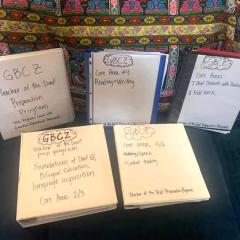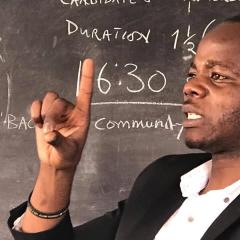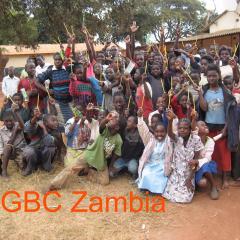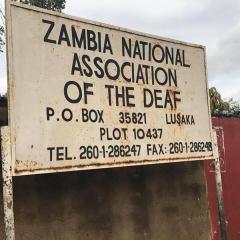Black Deaf Organizations

Deaf organizations have provided social outlets, advocacy, spaces of cultural exchange, language preservation, and support throughout the decades. However, Deaf organizations and social spaces have not always been open to or conscious of Black Deaf people’s needs or potential to lead. For example, the National Association of the Deaf (NAD), founded in 1880, did not permit Black Deaf people to join or vote within the organization until 1965, after the passage of the Civil Rights Act of 1964 (cite). This organization struggled to address Black Deaf people’s needs over time (Teeter, 1980), and a formal conference resolution or organizational apology was not made until 2012. Because of segregated spaces like this, Black Deaf people created organizations, social clubs, and support networks. They led community initiatives that focused on the needs of Black Deaf people. Organizations like the National Black Deaf Advocates (NBDA) was officially founded 1982 by and for Black Deaf people to advocate for access to education, employment, and social services. This organization and the affiliated state chapters have promoted community engagement and leadership within the Black Deaf community for over 40 years.
In California, Black Deaf leadership and involvement have ebbed and flowed, with some organizations dying out and new ones established. There are three active NBDA chapters in California. First established as the OakTownBDA in 1988 and disbanded between 1992-1993, the chapter reactivated as the Bay Area Black Deaf Advocates (BABDA) in 2011. The Los Angeles Black Deaf Advocates (LABDA) chapter disbanded, and the Southern California Black Deaf Advocates (SoCal) chapter was reestablished in 2019. This chapter now serves all of Southern California through community meetings and cultural programs sharing many of the same goals as the former LABDA. The Sacramento Black Deaf Advocated chapter was newly established in 2020 and has had an active presence on social media. There are also international Black Deaf organizations like Give Back to Community-Zambia (GBCZ). This organization was founded in California but serves Black Deaf communities in Africa. Its mission is to improve the lives of every Deaf Zambian through quality education, equal language access, appropriate health care, and improved employment opportunities.
California also used to have a chapter of the National Alliance of Black Interpreters, Inc. (NAOBI, Inc.). The Los Angeles chapter was founded in 2003 and promoted excellence and empowerment among Black sign language interpreters (Deaf and hearing). The Day of Professional Development, Silent Karaoke, and Kickin it with Series (an event where seasoned interpreters attended the business meeting and would answer questions for newer interpreters) were well-known annual events. With great sadness, this organization disbanded in 2015 because of a lack of participation. There is still a great need and hope that the organization will one day reignite in Los Angeles. The organization is still thriving in Washington, D.C., Detroit, New York, Atlanta, and Chicago.
Black Deaf-centered organizations are counter spaces, or spaces designed explicitly for marginalized communities to provide respite, safe space, and cultural connections (Case & Hunter, 2012). They support the well-being, identity development, and sense of belonging of many Black Deaf individuals. Our community members share their stories and the importance of their Black Deaf counter spaces, leadership, and involvement.
ReferencesCase, A. D. & Hunter, C. D. (2012). Counterspaces: A unit of analysis for understanding the role of settings in marginalized individuals’ adaptive responses to oppression. American Journal of Community Psychology, 50(1-2), 257-270.
Teeter, S. (1980, July 6). Need of Deaf Blacks Recognized. The Cincinnati Enquirer.
https://www.nbda.org/EE/files/Cincinnati_Enquirer_Article_-_July_6,_1980.pdf
Interview with the NBDA Pioneers
https://www.dailymoth.com/blog/interview-with-nbda-pioneers
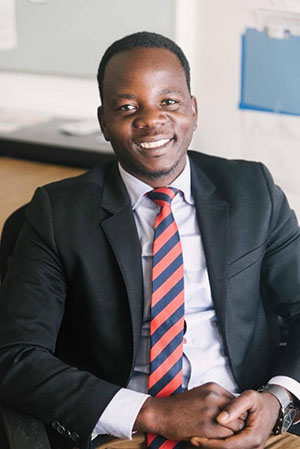
Francis Phiri
Francis Phiri was born and raised in Lusaka, the capital of Zambia in Africa. At the age of 12, he became ill with malaria and it caused his hearing to slowly deteriorate, becoming Deaf at age 18. After his parents died he lived with an aunt who also died when he was in 10th grade, leaving him homeless. He went to the Association of Sign Language Interpreters of Zambia (ASLIZ) to do volunteer work and that is where he met Madam Maria Milila of the International Labor Organization who supported him in high school. It was there he met Frank Lester, an American teacher who is also deaf and was in Africa working as a Peace Corps volunteer. Francis graduated high school in Zambia in November 2008, and in August 2009, Lester made good on his promise to bring Francis to the United states on a student visa.
Francis studied at Rochester Institute of Technology then returned to Ohlone College in Fremont, CA to complete his degree in Deaf Studies and Liberal Arts. He currently teaches American Sign Language at a private San Francisco international language school and the ABC Languages program. He is a motivational speaker and organizes monthly Deaf Night Out and ASL Meet-ups in San Francisco.
The support Francis received during his childhood in Zambia motivated him to create his non-profit organization, Give Back To The Community In Zambia (GBC-Zambia).
Watch Interview with Francis Phiri
Interviewer: Lissa Ramirez-Stapleton
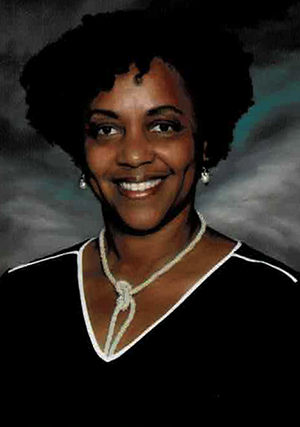
Yolanda Roberson-Adeoye
Yolanda Roberson-Adeoye has been a History/Social Studies teacher for students at Marlton School for 25 years. She loves reading, traveling, cooking, and house decorating. Yolanda lives in Mission Hills, is married, has two adult sons, and is a grandmother. Active in service to her community, Yolanda was the medal bearer for the Deaflympic World Games in 1985. She was the president of the Los Angeles Black Deaf Advocates (LABDA) from 1990-1993. Yolanda was also a contestant in nine Deaf and hearing beauty pageants and was crowned Miss Black Deaf America in 1989 by the National Deaf Advocates.
Roberson, Y. (1992). Los Angeles Black Deaf Advocates. The GLAD News, 25(1). 8-9.
Watch Interview with Yolanda Roberson-Adeoye
Interviewer: Tiara Green



